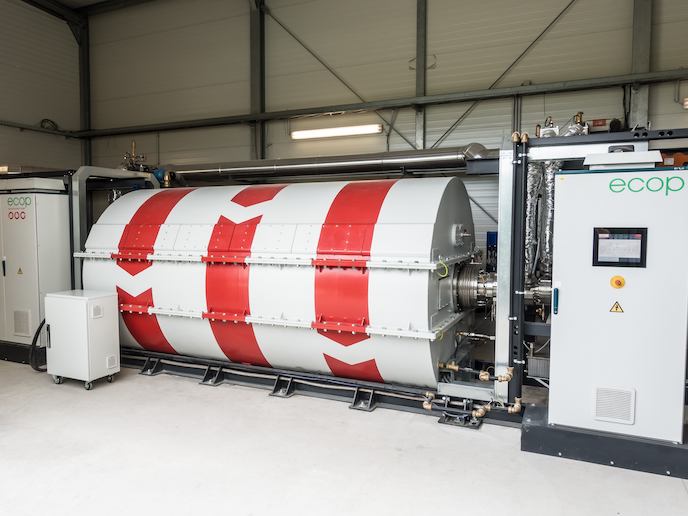Innovative heat pump could prove a green game changer for industry
The EU aims to reduce greenhouse gas emissions by more than 40 % by 2030, a target which is currently being increased to 55 %(opens in new window). Across industry processing, heat is responsible for 74 % of all energy consumption(opens in new window), so decarbonising these processes is essential to tackle climate change. There is a strong consensus that heat pumps will be key to this, for temperatures up to 150 °C. Heat pumps have a number of advantages over other renewable technologies in this temperature range, including their availability in both summer and winter, their lower cost per kWh and their efficiency. Yet, there remains a lack of marketable solutions. After confirming the ability of heat pumps to reach temperatures up to 150 °C, the EU-supported Rotation Heat Pump project developed two prototypes and a pilot plant with early adopter Bioenergie Bucklige Welt(opens in new window) (website in German). The project also identified the parameters necessary for series design and production. “For industrial processes such as distillation, pasteurisation, washing and cooking, our technology can fill the gap in the market, with an efficiency in the 100-150 °C temperature range exceeding other renewable solutions by up to 70 %,” explains Bernhard Adler, managing director of ecop(opens in new window), the project host and winner of a European Business Award for the Environment(opens in new window) in 2018. Rotation Heat Pump expanded on ecop’s prior heat pump development work, which had resulted in an initial model and 68 worldwide patents.
Development and optimisation
Heat pumps harness an external energy source to transfer thermal energy from a warmer area to a cooler area for heating – or vice versa for cooling. The thermal source typically comes from the air, the ground, water or exhaust air. Heat pumps have been adopted in industries such as the food and beverage, wood and paper, and chemical industries, where they can be used for processes such as drying and dehydration, evaporation, washing and cleaning, sterilisation and pasteurisation. Rotation Heat Pump’s innovation was to develop a one-phase thermodynamic cyclic(opens in new window) process instead of the thermodynamic two-phase compression process of conventional heat pumps. For the first time, this enables high-scale industrial use, as conventional heat pumps are not suitable for the high temperatures and fluctuating conditions of industrial settings. Additionally, existing solutions typically use refrigerants in the heat transfer process which damage the environment. The Rotation Heat Pump process uses a widely available, inexpensive, safe inert gas comprising helium, argon and krypton. Rotation Heat Pump created two prototypes. The first was developed for a combined heat and power plant near Vienna where the heat pump uses waste heat from the plant’s steam turbine for direct use in the district heating network. The second prototype was developed for internal testing and as a showcase plant.
Overcoming the limitations of existing heat pumps
A number of tests were conducted and successfully evidenced stable operations, high temperatures up to 120 °C and a temperature lift (the difference between heat source and temperature produced) of 35 Kelvin. There are plans to increase to 50 Kelvin by the year’s end. Additionally, a coefficient of performance(opens in new window) (COP) of up to five was achieved, meaning that the system could create up to five times more thermal energy than the electrical energy necessary to generate it. “Our tests confirmed that our simulations were accurate with a COP practically unfeasible for normal heat pumps,” says Adler. The team is now developing demonstration projects, especially to integrate and customise their system with the industrial heating process.







